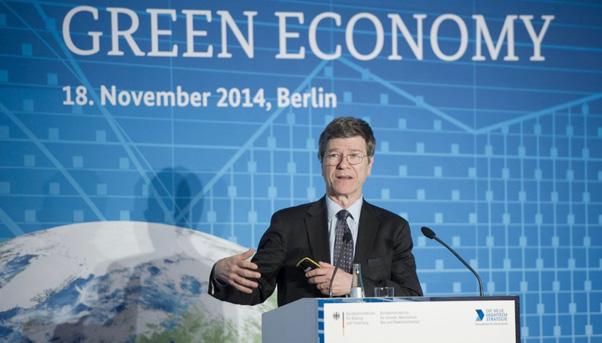
«2015 will be remembered as the year in which a turning point will occur with regard to large infrastructure investments. All the large works launched during 2015 had financial and environmental sustainability as top priorities. In July, the great UN convention at Addis Ababa finalised the financial tools capable of firmly boosting these types of responsible investments».
Jeffrey Sachs is 60 years old and is the most prestigious “economist of global development”. He is currently in charge of the Earth Institute of Colombia University, but he has also been travelling around the world for many many years now trying to help governments and corporations to restore their finances and to define basic infrastructure projects that respond to efficiency criteria, energy savings and the capacity of promoting well-being.
During the years, he has been a consultant of the Bolivian, Estonian, Polish and Russian governments and of approximately twenty African Countries. All have been greatly able to improve with regard to their infrastructure capacity. He is currently a consultant of the UN General Secretary, Ba Ki-Moon, for the Millenium Development Goals initiative, which aims at reducing extreme poverty, illnesses and hunger: all issues that are still present in many parts of the world.
His last book, published in America, at the end of December 2014, is entitled “The Age of Sustainable Developments”. It combines financial and social and environmental responsibility ones. An economist of the Keynesian School in its purest form, a pupil of Paul Samuelson at the Boston MIT, Sachs has many interests and is very committed to the global campaign against climate changes.
How is it possible to reconcile industrial growth and the needs connected to responsible development?
«To think in terms of responsible development does not only mean to construct solar, wind and geothermal plants instead of traditional coal and hydrocarbon ones, but to always keep all of Man’s needs in mind: needs that include safety, financial realism and an overall reliability.
Even to build a bridge, there are many different ways: we opt for the safest, the least destructive for the environment and the most efficient in the long-term. This context sees the proposal for the extension of the “carbon tax” to all industrial Countries. This would generate a new fresh income for governments, which can then be used to finance the construction of “new generation” infrastructures.

Professor, can you please illustrate this Project?
«This project is already active in many Countries. Its main idea is very simple: to tax carbon dioxide emissions, mainly generated by plants that function with petrol, but also, even if in a slightly minor quantity, by gas ones. The profit created can then be subsequently used to renovate infrastructures. It is not an exchange that brings a loss, but the exact opposite».
But how can these sums be used by Countries to finance new infrastructures?
«The richest and most industrialised countries on the planet promised to invest a hundred million dollars per year in new generation infrastructures, especially in developing Countries, starting in 2020. It is a huge leap, if compared to the current 25-30 million dollars.
The new income generated by the carbon tax represents an ideal financial platform for honouring this promise. These finances would help to create a more liveable world, a world with fewer natural and financial catastrophes, capable of providing the necessary goods and services, from transport to energy, as much as possible».
Have you applied the same “financial engineering” criteria to your other initiative, the Millennium Development Goals?
«Of course, I could not have done differently. This project was launched in 2000 by the UN secretary at that time, Kofi Annan, with whom I worked setting the technical parameters. Its aim is to defeat starvation and illnesses in the most underdeveloped Countries of the world. For these Countries, the issue concerning infrastructures and their financing is also crucial. Would you like to know something? In all these years I still have not managed to understand why, when one talks about Health he generates a significant response in terms of funds of many million dollars, but we encounter great difficulties when it comes to creating schools, and offering primary education: an issue not as important maybe as health, as in this last case we are talking in terms of life and death, but the schooling issue is not, in any case, less important.

We probably also need to consider the support given by the wealthy pharmaceutical companies that have every type of interest in expanding their markets, but while if we decide to build a hospital we do not encounter any kind of financial problems if, on the contrary, we decide to build a school, a laboratory or even a gym, or why not, to invest in teacher training activities, the issues normally faced are enormous. But, one must consider that when we are not capable of adequately educating and training a child in Nigeria, we will find the same child in the Boko Haram ranks a few years later».
If it is true that states also reduce loans because of internal debt issues, what is the attitude, instead, of large private corporations towards this issue?
«Fortunately we are frequently finding private companies that accept to enter into financial partnerships with us. With the telecommunication giant, Ericsson, for example, we launched “Connect to Learn” for on-line teaching purposes to be used in remote African villages. This is, albeit, a limited project: we must take a huge leap in terms of quality, because we cannot only assist a hundred children when instead millions and millions need our help. Can you understand why there is a need for constant and continuous support?».

